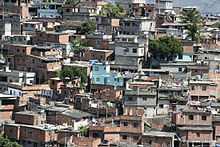
Brazil ranks 49.3 in the Gini coefficient index, with the richest 10% of Brazilians earning 43% of the nation's income, the poorest 34% earn less than 1.2%.[1]
According to PNUD, in 1991, 99.2% of the municipalities had a low/very low HDI; but this number has fallen to 25.2% in 2010. On the other hand, the number of municipalities with high/very high HDI jumped from 0.2% in 1991 to 34.7% in 2010.[2] In 2012, the Brazilian HDI was 0.730, ranking 83rd worldwide and considered high.
- ^ "Pnad 2008 - Atualidades - UOL Educação". educacao.uol.com.br. Retrieved 3 April 2018.
- ^ "Archived copy". Archived from the original on 2014-03-13. Retrieved 2014-06-14.
{{cite web}}: CS1 maint: archived copy as title (link)
